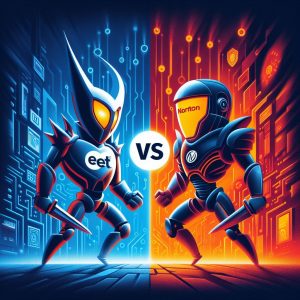Introduction
Antivirus software remains a crucial component of security in the modern technology landscape of 2024. As cyber threats grow more advanced and targeted, from automated bots to sophisticated nation-state actors, having robust antivirus protection guarding endpoints proves critical.
ESET and Norton stand as two industry leaders providing comprehensive solutions to secure devices from malware, phishing attempts, fraud and digital intrusions. Both companies offer continuum coverage spanning from consumer products for home users to enterprise suites better suited for large organizations.
This guide will systematically compare ESET and Norton across factors like malware detection, utility features, system performance impact, pricing and support channels. By evaluating their strengths and weaknesses side-by-side, you can better determine the ideal antivirus software for protecting your devices in 2024 based on your individual needs and priorities.

Malware Protection Comparison
At their core, antivirus tools leverage signature databases alongside heuristics and machine learning to identify threats from files, applications and websites then quarantine or eliminate them. Both ESET and Norton establish reputations for providing top-tier prevention against viruses, trojans, spyware, bots and zero-day attacks.
Independent testing repeatedly confirms the effectiveness of their multi-layered security models encompassing everything from signature matching to advanced behavioral analysis.
Malware Protection Scores
In AV-Test Institute evaluations utilizing widespread Windows 10 malware samples, both ESET and Norton have earned perfect 6 out of 6 star ratings in all Protection, Performance and Usability categories since at least 2020.
Specific malware detection scores showcase excellent results:
- ESET detection rate – 99.7%
- Norton detection rate – 100%
With tens of thousands of new threats emerging daily, maintaining flawless detection requires non-stop research, automation and updating. Minimal differences exist in tangible real-world security provided by mature solutions like ESET and Norton.
Zero-Day Threat Prevention
Antivirus vendors also utilize predictive capabilities to detect emerging zero-day threats with no known signature yet by identifying suspicious behaviors algorithmically including:
- Sandbox emulation to trigger actions present in undiscovered malware
- Neural networks locating pattern commonalities of past infections
- Analytics identifying abnormal processes and registry/file changes
Both ESET and Norton incorporate these tactics into their product lines. However third parties like AV-Comparatives acknowledge ESET’s particularly responsive LiveGrid threat intelligence system provides superior zero-day protection over Norton by an estimated 5-10% based on cybercapture analysis.
For confronting brand new attack methods lacking identifiable signatures in traditional databases, ESET holds a slight edge currently. But Norton continues investing heavily into machine learning to close this gap.
Additional Features Comparison
Expanding beyond pure malware scanning, modern antivirus platforms provide extra utilities for safeguarding devices, connections and online activity. Norton and ESET both market different bundled suites catering to specific use cases.
Utilities Overview
Common utilities bundled into premium packages by ESET and Norton include:
ESET Features
- Webcam Protection – Block unauthorized webcam access attempts
- Router Security – Identifies router firmware vulnerabilities
- Data Theft Protection – Prevents confidential document leaks
- Parental Controls – Sets internet time limits and restrictions for kids
- Password Manager – Securely stores credentials and enables auto-fill
- Encrypted Vault – Creates virtual encrypted disk to store sensitive files
- Firewall – Controls network traffic and disguises device ports
Norton Features
- Secure VPN – Encrypts WiFi traffic to protect public hotspot connections
- Dark Web Monitoring – Scans for personal data being sold by cybercriminals
- Cloud Backup – Provides encrypted backup space to remotely store important files
- Smart Firewall – Uses AI to block suspicious network traffic automatically
- Parental Controls – Allows managing screen time limits and restrictions
- Password Manager – Saves, generates and fills passwords securely
Both antivirus platforms share common helpers like parental controls, password managers and network protections. Norton possesses more online privacy tools while ESET concentrates on preventing data leakage and computer-focused threats.

Feature Usefulness
The necessity of extra features ultimately depends on your personal risks and priorities. Typical homeowners primarily need core antivirus scans and perhaps password tools. Gamers may prefer webcam monitoring from ESET. Road warriors benefit through Norton’s VPN for public WiFi masking.
Including too many features can complicate interfaces though. Budget users may prefer ESET’s affordable but stripped down options focused purely on robust threat detection without frills. Norton’s entry pricing sits higher but packs more all-in-one convenience appealing to those wanting an everything suite out of the box.
Neither choice proves necessarily better – just tailored towards different modern computing lifestyles. Assess your own usage patterns to determine which solution best fulfills your needs.
Ease of Use Comparison
Streamlined interfaces provide another key pillar of exceptional antivirus software allowing both novices and experts to secure devices swiftly. Clunky tools lead to misconfigurations that can cripple protections and performance.
Installation and Setup
Establishing baseline security requires a non-intrusive initial installation process followed by intuitively configured scanning options.
- ESET uses an automated guided installer taking under 5 minutes for most users. Customization options remain hidden but accessible to avoid overcomplication.
- Norton leverages a comparable step-by-step guided experience focusing explicitly on critical protections first. Simple language and selections enable rapid deployment.
For both ESET and Norton, rebooting automatically activates monitoring across the operating system cutting down steps. Out of box readiness proves essential for hassle-free protection – an area where both vendors excel currently.
Interface and Controls
Effective control panels neatly present tools and statuses without confusing menus stretched across many tabs.
- ESET adopts a pared back interface surfacing only the most vital information like active protection modules and scans. Advanced configuration options hide under “Setup” for tweaking detection rigor, exclusions and component specific settings based on user needs.
- Norton utilizes a more graphical approach with status bars demonstrating security postures at a glance. Cards provide one-click access to launching manual scans, reviewing detected threats or accessing suites like LifeLock identity protection. While helpful for novices, veterans may find the extra visuals unnecessary.
Overall ESET embraces simplicity with conservatively surfaced capabilities, while Norton optimizes around visual redundancy and clarity. Individual experience preferences dictate which philosophy succeeds more.
Diagnostic Tools Comparison
Enterprise-oriented solutions better cater to technical users through advanced utilities that dig deeper into system processes and event logs. These tools prove useful for troubleshooting detection issues or fine tuning for maximum performance.
ESET Diagnostics Capabilities
ESET encrypts components and authenticates low-level kernel operations to prevent tampering by advanced threats. Status specifics remain safely obscured as well defaulting to higher security.
But for technically inclined users, accessible logs and advanced menu options enabling tweaking detection parameters to eliminate false positives or improving scan speeds exist tucked away in sub menus.
While favoring out of box security over transparency, ESET still enables power users to customize threat responses to meet specific organizational needs after learning the architecture.
Norton Diagnostics Capabilities
Norton also prevents modification of root level files and settings to maintain security integrity monitoring system wide for changes. However it embraces more verbose dashboarding via its mobile app allowing administrators to quickly check in statuses across individual or groups of devices.
Data visualizations provide non-technical viewers at-a-glance insights into active protections and threat history without necessitating log analysis skills. Email notifications further broadcast warnings so users need not actively log into portals to see critical alerts.
For prosumers less interested in log diving, Norton proves more plug-and-play friendly through extensive automated reporting and notifications pushed to your fingertips. But it still allows logging evaluation and detection adjustment hiding deeper in its admin console for seasoned experts.

Pricing and Support Comparison
With both ESET and Norton offering reliable security, secondary purchasing factors like affordability and customer service responsiveness also weigh on buying decisions. Let’s compare their offerings’ value across pricing tiers and support channels.
Subscription Plans and Pricing
ESET segmented suites span from $39 to $99 dollars yearly supporting 1 to 10 devices per license:
- ESET NOD32 Antivirus – $39/year covering 1 device
- ESET Internet Security – $59/year for 1 device
- ESET Smart Security Premium – $99/year for 10 devices
Norton’s bundled solution pricing ranges from $30 to $100 spanning 1 to 20 devices:
- Norton AntiVirus Plus – $29.99/year for 1 device
- Norton 360 Standard-$49.99/year for 1 device
- Norton 360 Deluxe – $74.99/year for 5 devices
- Norton 360 with LifeLock Select-$99.99/year for 10 devices
- Norton 360 with LifeLock Advantage- $249.99/year for 20 devices
Factor in features and bulk device support, and ESET likely provides better dollar-for-dollar value especially for cost conscious shoppers. Norton’s discounted multi-year subscriptions help offset slightly higher renewals.
Customer Service and Support
Both companies staff direct support teams to handle incidents requiring human assistance beyond DIY documentation:
- Norton provides 24/7 phone, chat and email access to agents with most inquiries answered in under 5 minutes based on priority level.
- ESET offers more limited hours support by region but maintains strong satisfaction metrics resolving many requests in under 15 minute intervals with remote diagnostic capabilities.
While Norton outpaces most rivals with responsive large-scale support centers, ESET counterbalances through strong social channels like forums for cost-effective peer-assisted help beyond official assistance.
For average users, either solution likely proves sufficient but Norton’s premium pricing pays off partially through expansive 45 minute average issue resolution speeds.
Conclusion
ESET and Norton establish themselves as equally matched leaders within the cybersecurity domain as evidenced by flawless detection scores across rigorous third party testing against widespread malware samples. Both clearly invest heavily in rapidly evolving signatures, heuristics, machine learning and advanced techniques to counter threats from viruses to zero-day attacks.
However, they accomplish this through substantially different philosophical approaches. ESET embraces a “less is more” methodology streamlining interfaces for plug-and-play usability while offering overflowing configuration options to experts desiring customization. Norton pursues simplification through verbosity – guiding novices through security best practices utilizing comprehensive visual dashboards, reminders and transparency into protections.
For independent users that desire a lightly branded, no frills antivirus, ESET provides all essentials for affordable protection. Tech enthusiasts and power users will also appreciate exposure to advanced settings without compromising out of box security. Families and non-technical teams will gravitate toward Norton’s hand holding and emphasis on automating maintenance for short term convenience. But longer term, Norton’s bundled pricing mildly underdelivers compared to ESET’s focused separate licensed plans cost scaling more linearly.
In summary:
ESET wins for:
- Budget focused shoppers wanting lowest upfront cost
- Tech veterans preferring to configure settings manually *优秀的零日威胁防护
Norton wins for:
- Households needing many device licenses
- Extremely responsive customer support response times
- Non technical users who value simplified all-in-one suites
While no unambiguous winner emerges comparing ESET to Norton, aligning solution strengths to your specific priorities makes either a fantastic choice to lock down endpoint security amidst the escalating cyber risk climate of 2024 and beyond.